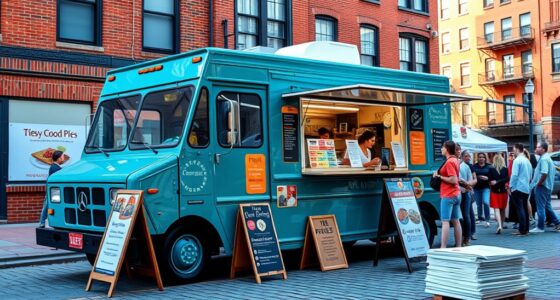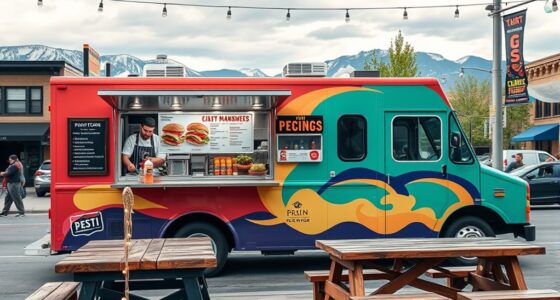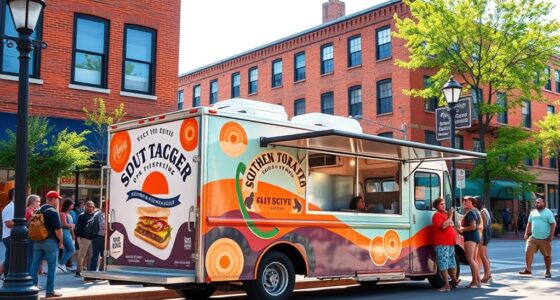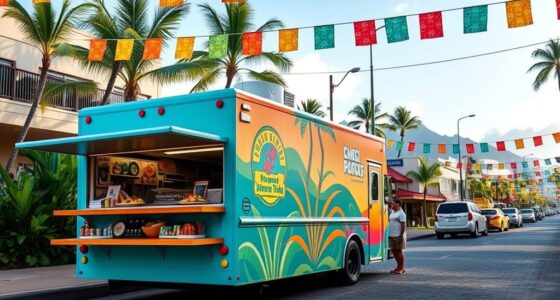To launch a food truck in Morgantown, you’ll need permits like a retail liquor license, health clearance, and local business licenses, costing around $1,864 total. Find prime spots downtown, near university events, or at festivals to attract traffic. Develop a menu featuring local flavors and focus on food safety and compliance. Use social media for marketing and community engagement. Want to know more about managing regulations and maximizing your success? Keep exploring for detailed tips.
Key Takeaways
- Obtain required permits including a Retail Class A License, WV Business License, health permit, and local street vending licenses.
- Startup costs range from $40,000 to $150,000 for the truck, plus $2,000–$3,000 for inventory and licensing fees around $1,864.
- Prime vending locations include downtown Morgantown, Prospect Street near WVU, and high-traffic festival or event sites.
- Develop a menu featuring Appalachian-inspired comfort foods, ensuring food safety compliance and appropriate equipment.
- Promote your food truck through social media, participate in local events, and connect with organizers for strategic exposure.
Essential Permits and Licenses for Morgantown Food Trucks
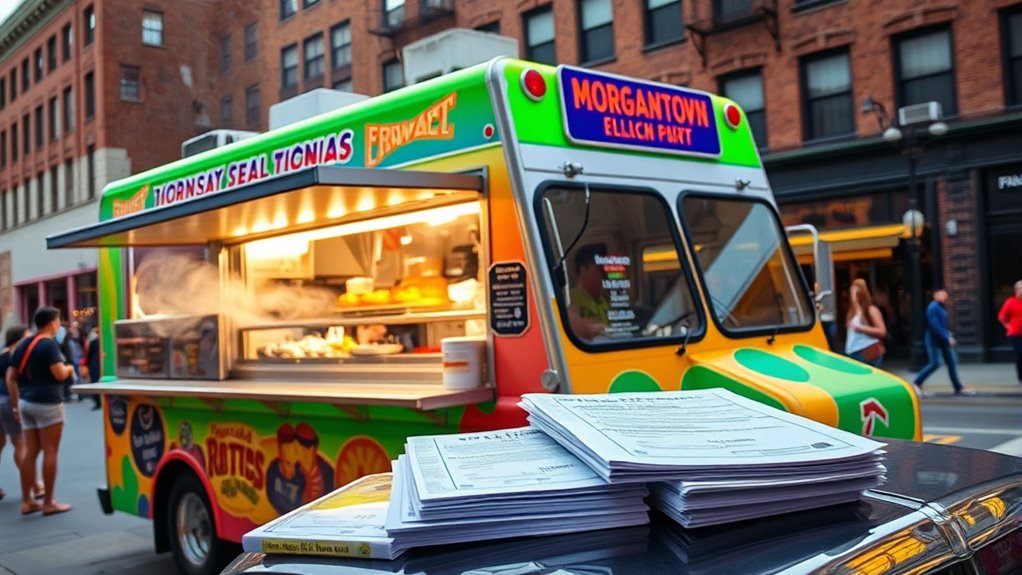
Are you planning to start a food truck in Morgantown? You’ll need several essential permits and licenses to operate legally. First, obtain the Retail Class A License, which covers food inventory, kitchen standards, and alcohol age verification, costing about $1,483.33 plus a $100 operational fee, paid via certified or cashier’s check. You’ll also need a WV Business License Certificate from the WV State Tax Department and renewal every year. The City of Morgantown requires a Business License and a Hawker Peddler License for street vending, though private property vending with landowner permission doesn’t need a permit. Additionally, a health permit from the Monongalia County Health Department is mandatory, along with food safety compliance and inspections. Make sure all documentation is in order before you hit the streets. Proper licensing ensures compliance with local regulations and simplifies the process of operating your food truck legally.
Understanding the Costs and Fees Involved
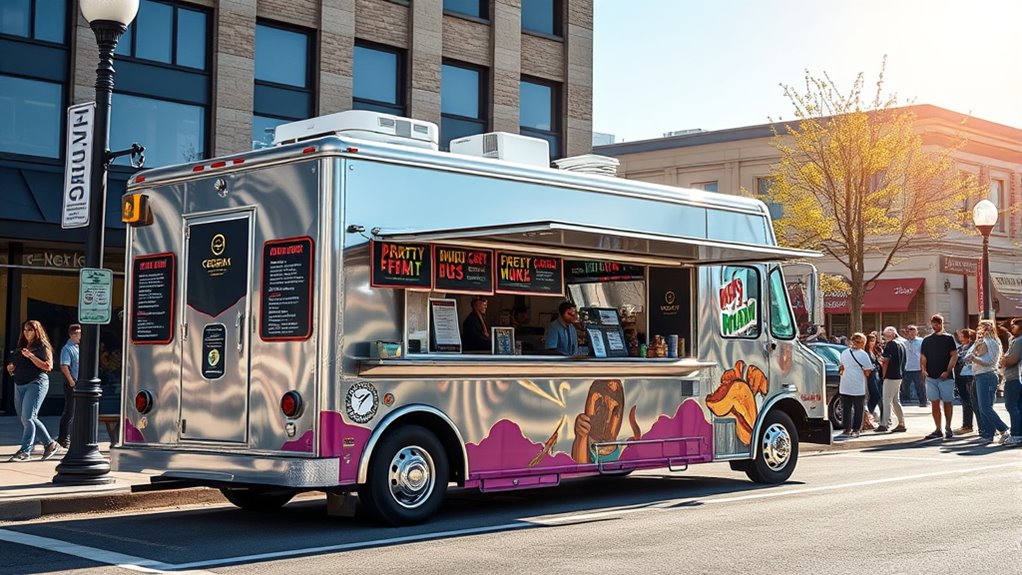
Starting a food truck in Morgantown requires careful planning of your initial investment and ongoing expenses. The truck itself can cost between $40,000 and $150,000, depending on size, features, and equipment quality. Renting a truck may lower upfront costs but will increase monthly expenses. You’ll also need $2,000 to $3,000 for inventory and about $300 for serveware. Permit and licensing fees typically hover around $1,864, though costs can vary based on specific requirements and grants. Operating costs include fuel, maintenance, insurance, and utilities, which can total $500 to $1,000 annually. Staffing expenses depend on your team size, with additional costs for training and benefits. Marketing, branding, and event participation will also add to your overall budget. Location can significantly influence startup costs and permits, so researching local fees is essential for accurate budgeting. Additionally, understanding Glycolic Acid Benefits for Skin can be helpful if you plan to offer skincare products or services related to your food truck branding.
Prime Locations and Vending Spots in Morgantown

Finding the right prime locations and vending spots in Morgantown can substantially boost your food truck’s visibility and sales. Downtown Morgantown offers mapped and designated spaces regulated by city ordinances, making it easier to operate legally. High-traffic areas like Prospect Street near WVU are ideal during campus events such as Homecoming Parade. Event venues, corporate parks, and neighborhood parties also attract large crowds, creating excellent opportunities. Downtown festivals, street fairs, and school events provide seasonal and temporary vending spots for increased foot traffic. To maximize your success, focus on locations with high visibility and foot traffic, like downtown or near campus. Remember, securing the right permits and understanding vending regulations guarantees smooth operation and better customer access in Morgantown. Additionally, Royal Creamery & Icery, a family-owned ice cream truck located in Moneta, VA, about 170 miles from Morgantown, offers a charming and family-friendly experience that could be a great addition or inspiration for your vending options in the area. Exploring popular gelato concepts can also attract a diverse customer base and set your truck apart from traditional ice cream vendors.
Developing a Compliant and Appealing Menu

To create a menu that’s both compliant and appealing, you need to take into account local tastes and dietary preferences, making sure your offerings resonate with Morgantown customers. You’ll also have to guarantee your food preparation methods and equipment meet safety regulations while allowing for efficient service. Balancing variety with safety and practicality will help you attract customers and stay within legal requirements. Incorporating diverse designs in your food presentation can further enhance customer experience and distinguish your truck from competitors.
Menu Variety and Local Tastes
Developing a menu that appeals to Morgantown’s residents requires a deep understanding of local tastes and preferences. You should incorporate hearty, comfort foods made with local ingredients like beef, pork, corn, and apples. Popular dishes such as pepperoni rolls, biscuits and gravy, fried chicken, and stews resonate with the community. To stand out, consider Appalachian flavors and seasonal produce, blending tradition with modern twists through fusion options. Incorporating aesthetic dinnerware and serveware can enhance the presentation and overall dining experience. Imagine:
- Warm pepperoni rolls oozing with cheese
- Crispy fried chicken paired with sweet corn
- Hearty stews with farm-fresh vegetables
- Colorful bowls of Asian or Latin-inspired dishes
- Fresh apple and pork sliders with regional spices
Balancing familiarity with innovation keeps your menu appealing and diverse.
Food Safety and Equipment
Ensuring food safety while creating an appealing menu requires strict adherence to local health regulations and the right equipment. In Morgantown, your food truck must meet Monongalia County Health Department standards, including regular inspections and proper permits. Essential equipment includes refrigeration units to keep perishables at safe temperatures, handwashing stations with potable water, and a water heater system that meets safety standards. Proper waste management with adequate grease traps and fire safety equipment, like extinguishers, is also mandatory. When developing your menu, focus on items that can be safely prepared and stored within your truck’s capabilities. Use ingredients from licensed suppliers and design workflows to prevent cross-contact. Staff training in food safety and hygiene is vital to maintain compliance and protect your customers. Additionally, understanding food safety regulations and ensuring staff are well-trained in these protocols can prevent violations and potential legal issues.
Effective Marketing Strategies to Grow Your Business
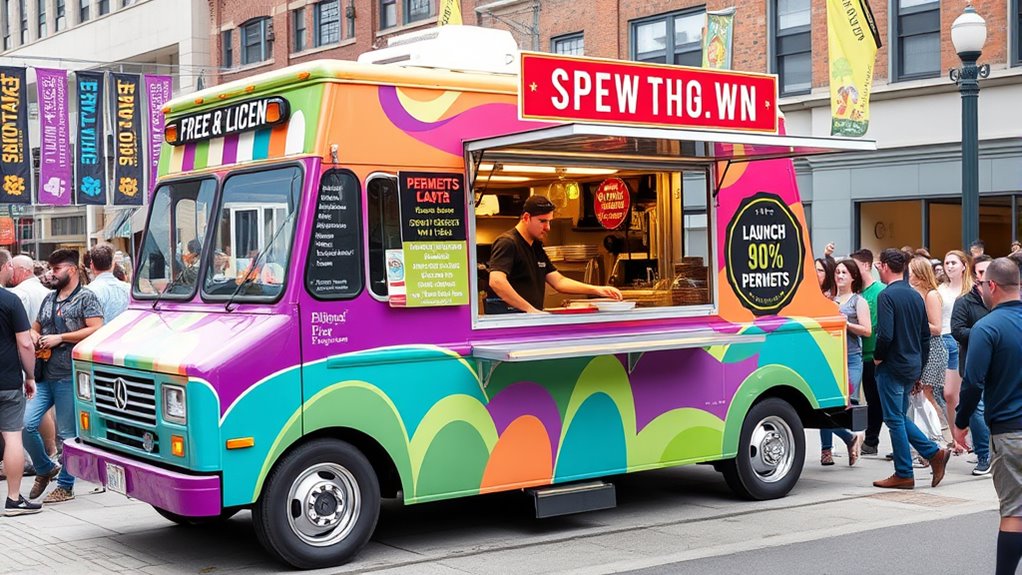
To grow your food truck business, focus on leveraging social media platforms like Facebook to reach more customers and boost sales. Participating in local events and festivals can also increase your visibility and create direct engagement. Combining these strategies helps you build a loyal customer base and expand your presence in Morgantown. Additionally, implementing loyalty programs and seasonal promotions can lead to a 30% increase in repeat visits, further strengthening your customer relationships. Incorporating brand awareness strategies can also help establish a memorable identity for your food truck in the community.
Leverage Social Media Platforms
Leveraging social media platforms effectively can substantially expand your food truck’s reach and attract more customers. Focus on platforms where your core audience is most active, like Instagram, YouTube, and Twitter. Use Twitter for real-time updates on location, menu items, and community engagement. Share mouthwatering photos and behind-the-scenes content on Instagram to entice foodies. Maintain consistent branding across channels to build recognition and loyalty. Implement engaging tactics such as polls, contests, and responding promptly to comments to foster relationships. Collaborate with local influencers and run geo-targeted ads to boost foot traffic. Incorporate social media promotions with online ordering, and use food truck apps for visibility and efficiency. Highlight sustainability efforts to connect with eco-conscious customers and reinforce your brand values. Additionally, tracking engagement metrics across platforms can help identify which content resonates most and refine your marketing strategy over time to optimize reach and engagement. Utilizing AI security insights can also help protect your online presence from cyber threats and ensure customer data privacy.
Participate in Local Events
Participating in local events offers a powerful way to boost your food truck’s visibility and attract new customers in Morgantown. Events like StoryFest, farmer’s markets, and music festivals draw diverse crowds, giving you broad exposure. Large festivals and sporting events generate high foot traffic and sales opportunities, while recurring events like fairs and private parties provide steady business. To maximize success, tailor your menu to fit each event, offering a streamlined MVP with popular items and exclusive dishes to entice attendees. Partner with other vendors, local businesses, or food trucks for cross-promotion and shared marketing efforts. Position your truck strategically near high-traffic areas, use efficient service systems, and capture engaging photos and videos. Promotion through social media and influencer collaborations can further amplify your presence at these local gatherings. Additionally, many events in Morgantown actively seek food trucks, making it easier to find suitable opportunities and connect with organizers.
Navigating Additional Regulations and Compliance Requirements
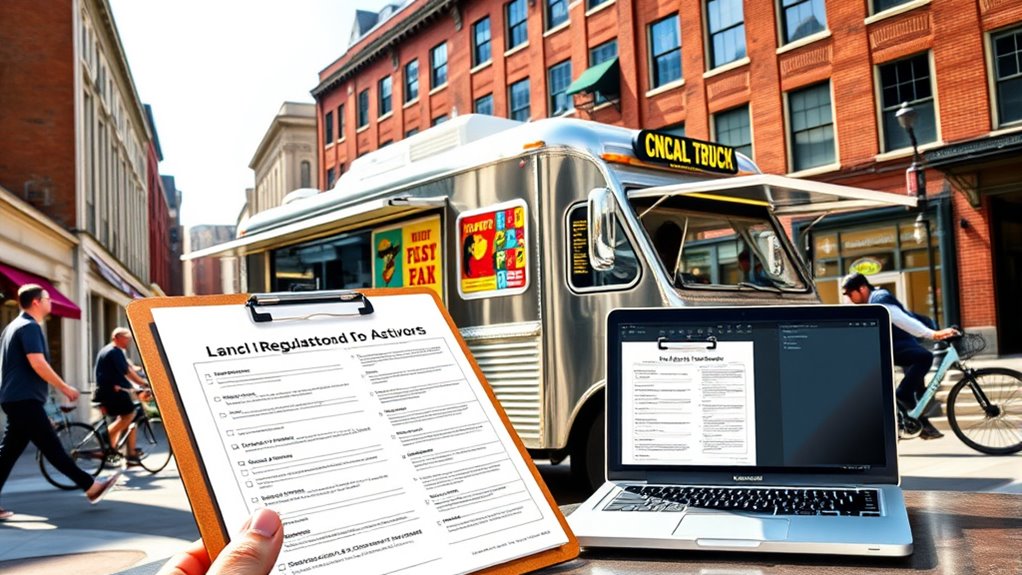
Guiding the complex landscape of regulations and compliance for food trucks in Morgantown requires understanding both state-level mandates and local ordinances. You’ll need to navigate propane capacity limits, license restrictions, and GPS tracking requirements. Insurance must name local authorities as additional insured, and health inspections go beyond routine checks if foodborne illness occurs. Locally, you’ll need a Morgantown Business License and possibly a Hawker Peddler License, especially for street vending. Restrictions include parking rules, staying 20 feet from intersections, and obtaining special permission for nighttime vending. You’ll also face health and safety regulations like annual fire inspections, food safety training, and approved food prep plans. Meeting these mandates ensures your compliance, permits, and success in Morgantown’s vibrant food scene. Additionally, understanding food safety training is essential to ensure proper handling and preparation of food, helping to prevent health violations and protect your customers.
Frequently Asked Questions
How Long Does It Typically Take to Obtain All Necessary Permits in Morgantown?
You’re probably wondering how long it takes to get all your permits in Morgantown. Typically, it takes about 4 to 8 weeks, depending on how quickly you prepare and submit complete applications. You need permits from the health department, city licenses, and possibly street vending licenses. Ensuring your paperwork is accurate and submitted early helps speed up the process, so plan ahead and stay organized.
Are There Any Specific Insurance Requirements for Operating a Food Truck in Morgantown?
Insurance requirements in Morgantown are strict yet essential for your food truck’s success. You must carry commercial auto insurance, general liability, and workers’ compensation if you have employees, meeting West Virginia’s minimum coverage limits of $300,000. While these requirements may seem burdensome, they protect your business from costly claims and legal issues, ensuring you stay compliant with state and federal regulations while operating safely and confidently on Morgantown’s streets.
Can I Operate My Food Truck Year-Round in Morgantown’S Climate?
You can operate your food truck year-round in Morgantown, but you’ll need to adapt to the climate. Winters bring cold temperatures, snow, and shorter daylight hours, so plan for snow management, heating, and menu adjustments like hot foods. Make certain your vehicle is winter-ready and follow local safety regulations. Marketing strategies should highlight warm, comforting options, and participating in winter events can boost your sales despite seasonal challenges.
What Are the Parking Restrictions for Food Trucks During Special Events?
While you might think parking restrictions during special events are flexible, Morgantown enforces strict rules. You must park only in designated zones, avoid unauthorized areas, and follow signage. Enforcement is active, with fines and removal possible for violations. During events, parking is monitored via GPS and signage, requiring coordination with city officials. To stay compliant, plan ahead, respect restrictions, and guarantee your truck remains within approved locations.
Are There Any Grants or Financial Incentives Available for New Food Truck Businesses?
You’re wondering if any grants or financial incentives support new food truck businesses. While direct grants are limited in Morgantown, you can explore community support programs, local business grants, or partnerships with universities and agricultural groups. Some programs focus on rural or underserved areas, health, or education initiatives. Consider applying for low-interest loans, microgrants, or participating in entrepreneurial competitions, as these often provide valuable funding or resources for startup food trucks.
Conclusion
Starting your food truck in Morgantown is like planting a seed—you’ll need permits, a great location, and a tempting menu. Stay compliant and market smart, and your business can flourish. Remember, like a well-tuned orchestra, harmony among permits, location, and marketing creates success. Keep focused, adapt as needed, and soon your food truck will become a beloved fixture in Morgantown’s vibrant scene. The journey may be challenging, but with persistence, you’ll turn your dreams into reality.


